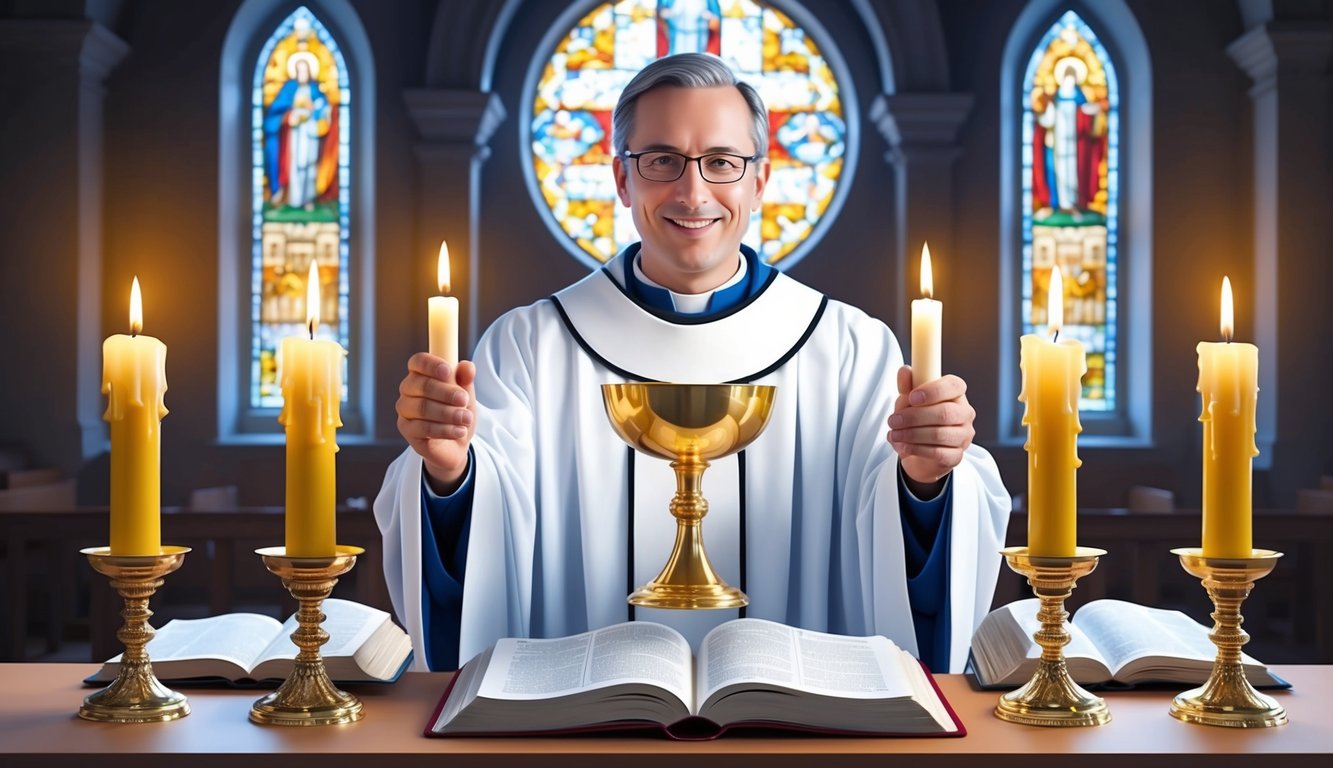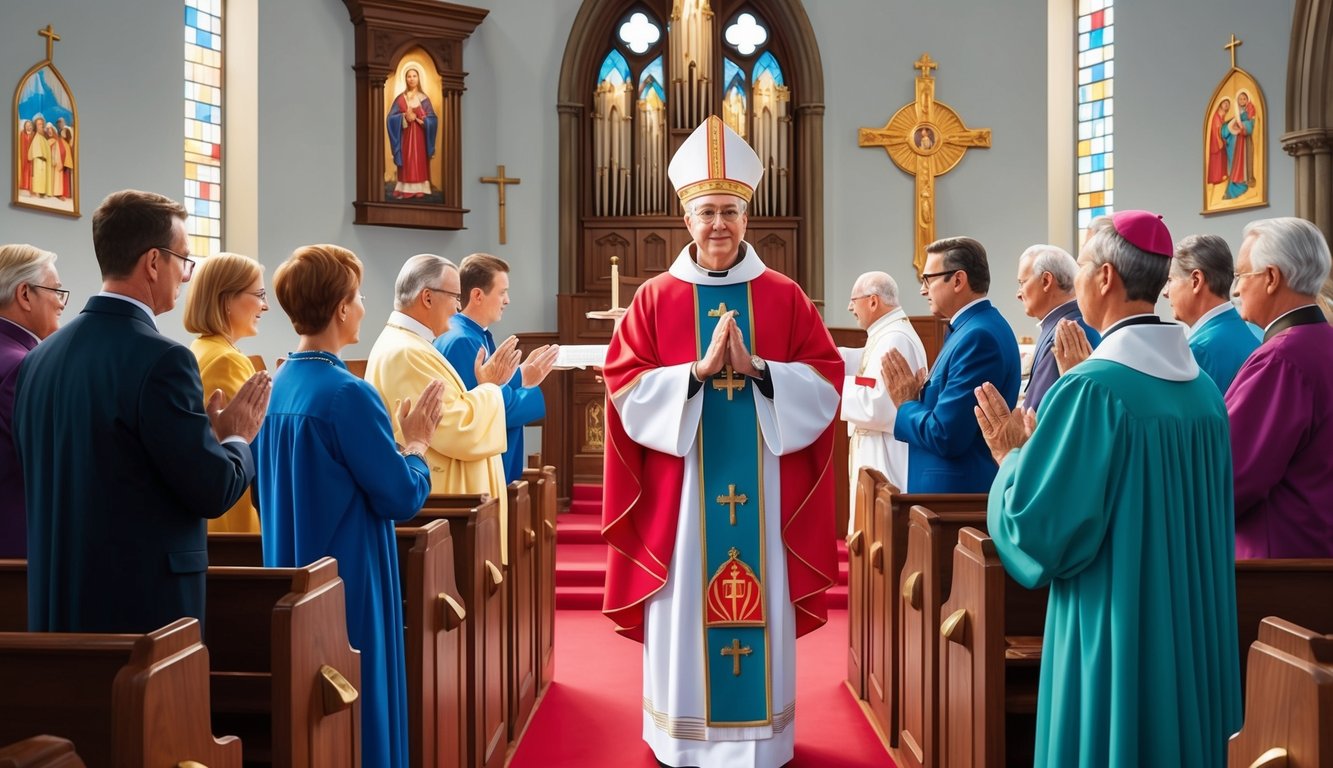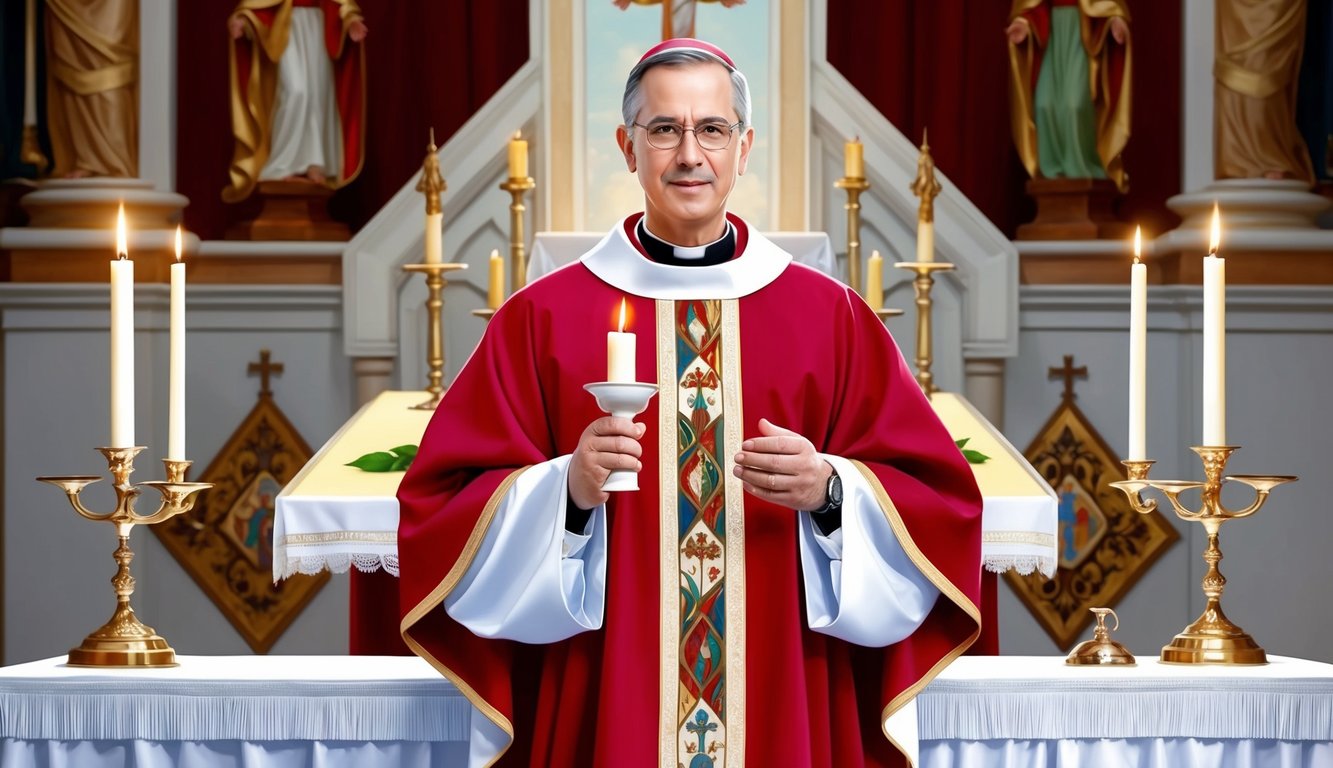Don’t Miss Out On This Unique Astrological Opportunity
Are you tired of spinning your wheels and getting nowhere? Simply put, you’re out of sync: you’re out of alignment with your astral configuration.
But: there’s a kind of map that can help you reclaim your alignment. Think of it as your own personal blueprint to success and happiness: a blueprint that will help you live your most amazing life.
Get started here.
Have you ever wondered about the role of a deacon within the Catholic Church? Deacons play a unique and essential role by bridging the gap between the clergy and the laity. Deacons are ordained ministers, and they serve the Church and spread the Gospel. They engage in a variety of duties, such as assisting during Mass and performing acts of charity.
There are two types of deacons: transitional and permanent.
Transitional deacons are on their way to becoming priests, while permanent deacons are often married men who have chosen to serve the Church in this capacity throughout their lives.
In the United States, many dioceses conduct psychological profiles of those aspiring to be permanent deacons to ensure they are suited for this lifelong service.
In embracing their calling, deacons follow the example set by Christ, focusing on service and spreading the message of love and compassion.
Whether participating in liturgical duties or working within their community, deacons truly embody the spirit of the diaconate by being the Church’s hands and feet in the world.
The Role and Functions of a Catholic Deacon
Catholic deacons serve vital roles within the church, focusing on both worship and community service.
They assist in liturgical functions, spread the Gospel, and engage in charitable activities to support the congregation and the wider community.
Liturgical Duties
As a deacon, your liturgical duties are central to your role.
You help during Mass, particularly in the preparation of the Eucharist.
In many services, deacons assist the priest on the altar, setting the table for the Holy Communion and ensuring everything is in place for the sacrament.
You might find yourself leading the congregation in prayer or reading Scripture.
Sometimes, deacons also take part in baptisms and weddings, emphasizing their integral role in the church’s sacraments.
Being visible and active at Sunday Mass and other liturgies enhances the worship experience for all attendees.
Preaching the Gospel
In your role as a deacon, preaching the Gospel is a key function.
You might deliver homilies during Mass, interpreting the Bible’s message for the congregation.
This involves studying Scripture and understanding its relevance to modern life.
By sharing insights from the Bible, you can inspire and guide your community, enriching their faith journey.
Your communication skills are essential in reaching people of all ages and backgrounds.
Engaging the congregation with relatable stories and teachings from the Gospel can make your homily impactful.
Service and Charity
Service is at the heart of your ministry as a deacon.
Engaging in acts of charity, you support those in need within and beyond your church community.
This might involve organizing food drives, visiting the sick, or running programs for the underprivileged.
By serving others, you embody Christ’s teaching of love and compassion.
Your efforts can galvanize the parish to get involved, fostering a spirit of community.
Whether you are helping at a local shelter or coordinating aid efforts, your role as a deacon is crucial in making a difference and spreading the church’s mission of service.
The Sacramental Nature of the Diaconate

The Catholic Church sees the diaconate as an important part of its clerical structure.
This section looks into how deacons fit into Holy Orders and their unique role in the Church’s sacramental life.
Ordination and Holy Orders
When you think of a deacon’s ordination, you see the beginning of their journey in the Church’s hierarchy.
Deacons are part of the Holy Orders, which includes bishops and priests.
This sacrament signifies a special anointing of the Holy Spirit.
Being a deacon means sharing in the Church’s mission of service.
Unlike priests, deacons do not celebrate the Eucharist but assist at Mass, proclaim the Word of God, and perform baptisms.
They are ordained to pray and lead, often working alongside priests and bishops to support their communities.
Sacramental Significance
As a deacon, your role embodies service to others as a sacramental sign.
This reflects the essence of what it means to serve in the Church.
You might not have all the responsibilities of a priest, but you are vital in connecting the faithful to God through acts of charity and service.
Deacons participate in many sacraments, like presiding over weddings and conducting funerals.
Your actions make visible the Church’s mission, emphasizing service and humility.
The Church sees deacons as a bridge, linking the clergy to the lay community, and enriching the spiritual life of those they serve.
Formation and Lifestyle of Deacons
Understanding the formation and lifestyle of Catholic deacons provides insight into their role in both church and community.
These dedicated individuals go through extensive education and manage unique family dynamics, contributing significantly to their vocation.
A deacon in Catholic church commits to a life of service, assisting priests during Mass, performing baptisms, and supporting charitable initiatives.
Balancing their spiritual duties with personal and professional responsibilities, they serve as a vital link between the clergy and the lay community.
Their dedication strengthens both church ministries and outreach programs, fostering faith and compassion.
Education and Training
Becoming a Catholic deacon requires comprehensive education and training.
The process usually involves several years of study, including theology and pastoral care.
Many candidates attend a seminary where they receive both academic and spiritual instruction.
This preparation ensures that deacons can serve their communities effectively.
The training also addresses pastoral and liturgical skills, allowing them to assist priests during Mass and perform certain sacraments. National guidelines such as the National Directory for the Formation, Ministry, and Life of Permanent Deacons in the United States outline these requirements, ensuring a standardized approach throughout the country.
Married Deacons and Family Life
Many permanent deacons are married, which adds a family dimension to their ministry.
When a married man is ordained, his wife and family become integral to his vocation.
The support of a deacon’s wife is crucial, as she often participates in church activities and shares in community responsibilities.
Balancing family life with diaconal duties can be challenging, yet many find this union enriching.
The blessings of marriage allow deacons to relate to parishioners facing similar life situations, offering guidance informed by personal experience.
This family involvement fosters a close-knit community that understands the value of shared life and faith.
Deacon’s Vocation and Identity
The vocation of a deacon is a lifelong commitment that shapes their identity within the church and their community.
Rooted in the traditions of the early church, the role of deacons emphasizes service and humility.
They are called to serve marginalized groups, assist in liturgical celebrations, and engage in charitable work.
A deacon’s identity is intertwined with their ministry, with a focus on being a bridge between the clergy and laypeople.
This role inspires others, contributing to a vibrant faith community where deacons play a vital part in spiritual life and development.
Community Involvement and Pastoral Care

Catholic deacons play crucial roles in community involvement and pastoral care.
They engage in various initiatives to address social justice, support those in need, and work closely with parishes and dioceses to spread spiritual and practical help throughout the community.
Social and Justice Initiatives
As a deacon, you actively participate in social and justice initiatives that aim to help the poor and marginalized.
You may organize charity events or collaborate with the laity to distribute resources to those in need.
Working as an ordained minister offers you the opportunity to encourage the assembly to contribute to justice causes.
Your involvement also means linking faith with real-world issues.
You might advocate for policies that ensure fair treatment for all or partner with organizations to promote peace and justice.
By doing so, you reflect Christ the Servant’s mission to care for the oppressed.
Supporting the Sick and Bereaved
Supporting the sick and bereaved is a key part of your ministry.
Often, you visit hospitals to provide comfort and spiritual support.
Your role allows you to offer prayers, listen to concerns, and bring a sense of peace during difficult times.
For those who have lost loved ones, you might assist pastors with funerals, ensuring they are handled with dignity and compassion.
Your gifts in pastoral care can help families find solace and strength through community outreach and shared faith, reminding them of the connection between the church and its members.
Engagement with Parishes and Dioceses
Your engagement with parishes and dioceses is vital for cohesive community support.
You work with pastors to enrich parish life, often leading ministries that cater to various groups within the church.
As a deacon, coordination with diocesan resources allows you to expand outreach programs.
Whether through educational workshops or organizing volunteer groups, you enhance the church’s ability to serve its members.
Your efforts bring together ordained ministers and laypeople, fostering a vibrant and active church community that reaches beyond the altar.
The Deacon in the Wider Church Community

Deacons play a crucial role in the Catholic Church beyond serving at Mass.
They engage with the church community in various ways, including governance and spreading the faith.
These roles support priests, bishops, and the diocese, providing a connection between church leadership and the wider world.
Participation in Church Governance
As a deacon, you actively participate in the governance of the church.
This role includes aiding bishops and priests in decision-making processes within the diocese.
The Second Vatican Council emphasized this involvement, recognizing the deacon’s role in bridging the gap between clergy and laity.
Deacons may serve on parish councils and committees.
They engage with matters such as parish operations and outreach programs.
This participation ensures that the voice and needs of the community are represented in church decisions.
You’ll also find that deacons provide valuable insights from their work in diverse community settings, whether in a hospital or local charities.
Promotion of Evangelization
Deacons contribute to evangelization in a key way.
They are called to spread the Gospel and bring the message of Christ to the larger community.
You play a vital role in this mission by organizing community services and educational programs.
The Acts of the Apostles provides insight, where early deacons actively expanded church communities.
Today, the USCCB and other organizations support deacons in these efforts.
Whether through preaching, conducting baptisms, or leading intercessions, your work as a deacon helps to foster spiritual growth and deepen faith in communities worldwide.



